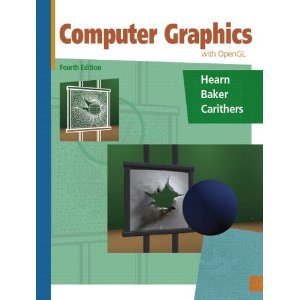
Class Lectures: TR 11:00AM - 12:15PM
Classroom: GOL-2455 |
Donald Hearn, M. Pauline Baker, and Warren Carithers, Computer Graphics with OpenGL (4th Edition), Prentice-Hall, 2010, ISBN: 0136053580 |
Each week will focus on a given specific topic and/or set of algorithms. The list of topics to be discussed each week can be found in the SCHEDULE section of this Web page . Note that not all topics are covered in the optional text and that supplemental notes will be provided as needed and posted in the CONTENT area of mycourses. Also on the SCHEDULE is a list of due dates for assignments and exams.
The best way to
keep up with the week by week happenings of the class is to consult the
DISCUSSION area of mycourses where weekly posts will summarize the plans
for the week. I will be using the main mycourses shell
CSCI.610.01 for posting all info related to the course.
There are three
categories of deliverables for the course:
The final grade will be determined using the following weights for each of the categories:
| Graduate | |
| Online Activities / Questions
|
25% |
| Programming Labs |
25% |
| MIDTERM Programming "EXAM" | 25% |
| FINAL Programming Exam" | 25% |
RIT's
Honor Code (from the
RIT Student Policy Library).
A general statement that sets standards of behavior for all
members of the RIT community.
RIT's
Academic Integrity Policy (from the
RIT Student Policy Library).
Defines the basic forms of academic dishonesty (cheating,
duplicate submission, and plagiarism) and explains the official
RIT policy regarding academic dishonesty.
Consequences of any discovered academic dishonesty incidents will be
applied as specified in these policies.
Generative AI
tools (such as ChatGPT, Bing Chat, GitHub CoPilot, midjourney, and
others) can be very helpful, but they also pose some risks--not just
because they may provide inaccurate responses, but also because they
make it very easy for you to avoid learning core concepts that are
fundamental building blocks in advanced work.
We will be doing an awful lot of coding in the class, as a means for you to learn the fundamentals of Graphics concepts and systems. The real learning comes from the doing as opposed to presentation of the solutions. As such, for this course, you cannot use generative AI tools in any manner to write your programs. When learning fundamental skills, you need to ensure that you master the basics. If I doubt authorship, I may ask you to explain the code or re-create aspects of the code in one of our labs – you must show that you have mastered the fundamentals. Thus, for this class, use of Generative AI tools will not be allowed.
If you have a concern related to gender-based discrimination and/or harassment and prefer to have a confidential discussion, assistance is available from one of RIT's confidential resources on campus (listedbelow).
The Center for Women & Gender: Campus Center Room 1760;585-475-7464; CARES (available 24 hours/7 days a week) Call or text 585-295-3533.
RIT Student Health Center: August Health Center, 1st floor;585-475-2255.
RIT Counseling Center: August Health Center, 2nd floor, room 2100;585-475-2261.
The Ombuds Office: Student Auxiliary Union/Room 1114; 585-475-7200or 585-475-2876.
The Center for Religious Life: Schmitt Interfaith Center, room 1400;585-475-2137.
NTID Counseling & Academic Advising Services:2nd Floor Lynden B. Johnson; 585-475-6468 (v), 585-286-4070 (vp).